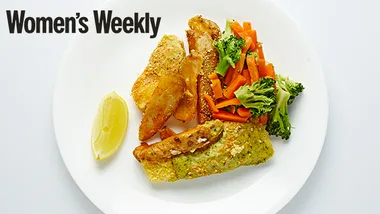Whether it’s deciding which cheese you can (or can’t) have or swapping your daily biscuits for bananas, chances are you’ve never been as interested in food as you are now. Your body is doing the incredible job of growing your baby, so it’s essential to be well nourished to fuel her continuing development and boost your energy levels.
Nutritionist and P&B expert Dr Joanna McMillan says eating well in pregnancy means sticking with a healthy, nutritious diet, while steering clear of a few foods that can be problematic for your baby.
“You may find that your appetite has increased, but it’s important that you choose slow-release food, as opposed to quick-fix sugar hits, to give you that extra energy boost when you’re feeling tired,” she says.
A diet incorporating food that releases energy slowly to reduce blood-sugar levels will keep your appetite in check and sipping water throughout the day will help you feel revitalised. Don’t forget, you only need an extra 1900 kilojoules a day in the third trimester. What food choices will ensure you stay healthy? And how can you boost your diet easily? Read on to discover the ideal way to eat well while pregnant.
Eat smarter!
In the first trimester a woman’s energy requirements are no greater than they were prior to pregnancy, but moving into the second trimester she requires an additional 1400 kilojoules a day.
In the third trimester that increases to 1900 extra kilojoules (National Health and Medical Research Council Nutrient Reference Values). This can be difficult to achieve, especially if you’re feeling nauseous in the first trimester. Don’t worry too much, says Joanna. “Unless you lose more than 10% of your body weight because you can’t keep food down, there’s no cause for concern.”
Carbohydrates
Our body needs extra energy throughout your pregnancy, and research shows that a low-GI diet improves outcomes for both mum and baby, says Joanna. So rather than cutting out carb-rich foods, switch to eating smart carbs – low-GI, high fibre options which release energy slowly.
Wholegrain bread, oats, muesli, barley, quinoa, brown rice, sweet potatoes and small waxy potatoes are all beneficial foods to include in your diet for these reasons. Surprisingly, fruit, beans, milk, yoghurt and, to a lesser extent, vegetables, will also contribute carbohydrates to your diet.
“Try to fill a quarter of your plate with low-GI carbohydrates at every meal and base snacks around fresh fruit to keep your energy levels consistent over the course of the day,” says Joanna.
Protein
Protein is essential for a baby’s growth and development. “This is in addition to your own protein requirements being met,” says Joanna. “Protein-rich foods also provide essential micronutrients, so aim to include a serve at each meal, such as yoghurt, milk, eggs, legumes, fish or lean meats.”
It’s important during pregnancy to get enough omega-3 fats, which are mostly found in oily fish. You may have read about high mercury levels in some fish being a health risk. Fortunately there are many types of fish that don’t pose this threat, which is why the NSW Food Authority recommends pregnant women have two to three serves each week, with the exception of catfish, orange roughy, shark, swordfish or marlin.
Atlantic salmon, canned tuna, canned salmon, mackerel, herring and sardines are rich sources of omega-3 and safe to eat. For more information go to www.foodauthority.nsw.gov.au/consumers/life-events-and-food/pregnancy/fish-and-mercury-faqs.
Dairy
Dairy products (or calcium-enriched alternatives) are ideal for providing your baby with the calcium she needs for bone development. “As her needs are prioritised, your teeth and bone health may suffer, so aim to get at least 1000mg a day,” says Joanna.
Hard cheese, yoghurt and milk are rich in calcium.You may wish to drink full- or reduced-fat rather than skim milk, as these contain vitamins A and D and more kilojoules. If you’d rather have skim milk you can easily boost your vitamin D intake through other sources such as oily fish or a little sunlight on your skin. Add orange-coloured vegetables and fruit for their high vitamin A content, and you’re set.
Don’t do dairy? Other sources of calcium include watercress, spinach, broccoli, almonds and calcium-enriched soy or rice milks.
Fruits and Vegetables
When serving a meal, try to get as many colours as you can on the plate. “Eat at least five serves of vegetables every day, as well as a minimum two serves of fruit,” says Joanna.
“By meeting these recommendations, you’re getting a wide range of all the essential vitamins and minerals you and your baby need to stay healthy, as well as boosting your immune system and fibre intake.”
If you struggle to get your portions up, add pulses or vegetables to casseroles and soups. Try to include plenty of green leafy vegetables too, which are nutrient rich and a good plant source of iron (although not well absorbed). Limit your intake of fruit juice, which is particularly high in kilojoules, and opt for water or a vegetable juice instead.
OFF THE MENU
Soft cheese If it has a rind or is blue, it might contain listeria, a bacteria that could harm your unborn baby.
Pâté Whether it’s meat or vegetarian, again listeria is a risk. Also, liver pâté could contain dangerously high levels of vitamin A.
Undercooked eggs The white and yolk must be cooked until solid to reduce the risk of salmonella poisoning.
Raw or rare meat Cook until hot all the way through, with no pinkness left.
Raw shellfish Ensure all shellfish has been prepared fresh and is cooked through.
Certain types of fish Avoid swordfish, marlin and shark, as they tend to contain high levels of mercury.



